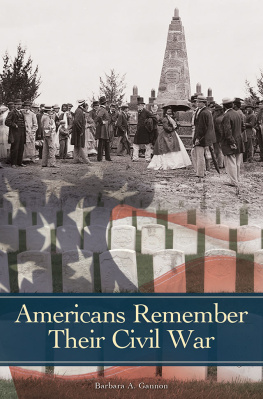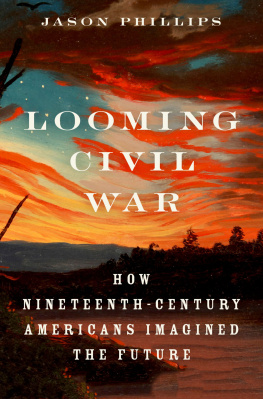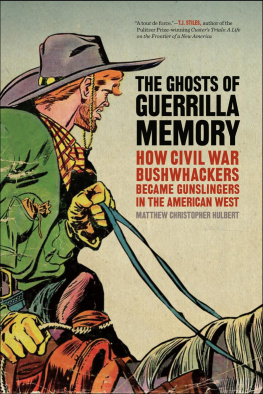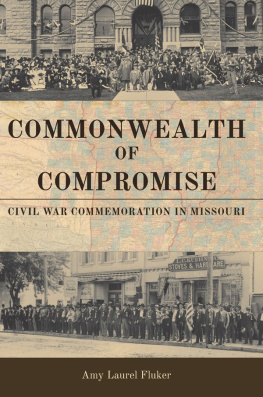AMERICANS REMEMBER THEIR CIVIL WAR
Recent Titles in Reflections on the Civil War Era
The Civil War at Sea
Craig L. Symonds
Politics and America in Crisis: The Coming of the Civil War
Michael S. Green
The Confederacy: The Slaveholders Failed Venture
Paul D. Escott
The Black Experience in the Civil War South
Stephen V. Ash
The Civil War in the East: Struggle, Stalemate, and Victory
Brooks D. Simpson
Civil War Journalism
Ford Risley
The Civil War in the Border South
Christopher Phillips
American Civil War Guerrillas: Changing the Rules of Warfare
Daniel E. Sutherland
The Civil War and the West: The Frontier Transformed
Carol L. Higham
Veterans North and South: The Transition from Soldier to Civilian after the American Civil War
Paul A. Cimbala
Food and Agriculture during the Civil War
R. Douglas Hurt
The Northern Home Front during the Civil War
Paul A. Cimbala and Randall M. Miller
AMERICANS REMEMBER THEIR CIVIL WAR
BARBARA A. GANNON
Reflections on the Civil War Era
John David Smith, Series Editor
Copyright 2017 by Barbara A. Gannon
All rights reserved. No part of this publication may be reproduced, stored in a retrieval system, or transmitted, in any form or by any means, electronic, mechanical, photocopying, recording, or otherwise, except for the inclusion of brief quotations in a review, without prior permission in writing from the publisher.
Library of Congress Cataloging-in-Publication Data
Names: Gannon, Barbara A., author.
Title: Americans remember their Civil War / Barbara A. Gannon.
Description: Santa Barbara, California: Praeger, 2017. | Series: Reflections on the Civil War era | Includes bibliographical references and index.
Identifiers: LCCN 2017007776 (print) | LCCN 2017009527 (ebook) | ISBN 9780275985721 (alk.paper: alk. paper) | ISBN 9780313049002 (ebook)
Subjects: LCSH: United StatesHistoryCivil War, 18611865Influence. | United StatesHistoryCivil War, 18611865Social aspects. | Collective memoryUnited States.
Classification: LCC E468.9 .G365 2017 (print) | LCC E468.9 (ebook) | DDC 973.7/1dc23
LC record available at https://lccn.loc.gov/2017007776
ISBN: 978-0-275-98572-1
EISBN: 978-0-313-04900-2
21 20 19 18 17 1 2 3 4 5
This book is also available as an eBook.
Praeger
An Imprint of ABC-CLIO, LLC
ABC-CLIO, LLC
130 Cremona Drive, P.O. Box 1911
Santa Barbara, California 93116-1911
www.abc-clio.com
This book is printed on acid-free paper 
Manufactured in the United States of America
In Memory
Cynthia Graham Hurd
Susie Jackson
Ethel Lance
Rev. DePayne Middleton-Doctor
Rev. Clementa Carlos Pinckney
Tywanza Sanders
Rev. Daniel L. Simmons Sr.
Rev. Sharonda Coleman-Singleton
Myra Thompson
They went home together, one summer night
in Charleston, June 2015.
Contents
Guide
Like Ol Man River, the distinguished Civil War historian Peter J. Parish wrote in 1998, Civil War historiography just keeps rolling along. It changes course occasionally, leaving behind bayous of stagnant argument, while it carves out new lines of inquiry and debate.
Since Confederate general Robert E. Lees men stacked their guns at Appomattox Court House in April 1865, historians and partisans have been fighting a war of words over the causes, battles, results, and broad meaning of the internecine conflict that cost more than 620,000 American lives. Writers have contributed between 50,000 and 60,000 books and pamphlets on the topic. Viewed in terms of defining American freedom and nationalism, western expansion and economic development, the Civil War quite literally launched modern America. The Civil War, Kentucky poet, novelist, and literary critic Robert Penn Warren explained, is for the American imagination, the great single event of our history. Without too much wrenching, it may, in fact, be said to be American history.
The books in Praegers Reflections on the Civil War Era series examine pivotal aspects of the American Civil War. Topics range from examinations of military campaigns and local conditions to analyses of institutional, intellectual, and social history. Questions of class, gender, and race run through each volume in the series. Authors, veteran experts in their respective fields, provide concise, informed, readable synthesesfresh looks at familiar topics with new source material and original arguments.
Like all great conflicts, Parish noted in 1999, the American Civil War reflected the society and the age in which it was fought. Books in Reflections on the Civil War Era interpret the war as a salient event in the hammering out and understanding of American identity before, during, and after the secession crisis of 18601861. Readers will find the volumes valuable guides as they chart the troubled waters of mid-nineteenth-century American life.
John David Smith
Charles H. Stone Distinguished Professor of American History
The University of North Carolina at Charlotte
A book has one author, but so many individuals contribute to its completion. First and foremost, I would like to thank John David Smith for signing me up for this project and being with me every step of the way as I completed it. This book is materially better because of his contribution. I would be remiss if I did not acknowledge Michael Millman of Praeger for his encouragement and patience as this project took longer to finish than planned. Partly, this book took more time because it synthesizes the work of so many fine historians, living and dead; I hope I did justice to their scholarship. Moreover, I wanted to convey one idea in these pages; these studies are all correct. Confederates hid in the attic, they paraded down main street. Union soldiers revered their former foes and rejected their comradeship. Americans forgot slavery and remembered emancipation; honored the union and sacralized disunion. The past is neither dead, past, nor unitary.
While I am grateful to all who have contributed to this volume, I must single out some of those whose kindness and support have meant a great deal to me in my career including William A. Blair, Gary W. Gallagher, Caroline E. Janney, Christian B. Keller, Kevin M. Levin, Anne E. Marshall, Brian Craig Miller, Mark E. Neely, Nina Silber, Andrew L. Slap, Elizabeth R. Varon, Joan Waugh, LeeAnn Whites, and Jim Weeks, who is with us only in memory. I would also like to recognize David W. Blight, for his body of work and his kindness to me as a young scholar, at least in academic years. Finally, to my sister Mary, and my brother Michael, your faith in me made all things possible.
In June 2015, the waning days of the Civil War sesquicentennial, the governor of South Carolina, an Indian American woman, asked the legislature to approve measures that would remove the Confederate flag from State House grounds. The Civil War began in South Carolina more than 150 years before, and it would be gratifying to think the battle for Civil War memory ended there when the flag came down a few weeks later. This victory seemed hollow; nine African American men and women lay deadpastors, grandmothers, and othersgunned down as they prayed in a historic Charleston church; that single act prompted this request. The accused shooters social media accounts demonstrated his devotion to white supremacy and the Lost CauseConfederate Civil War memory. In response to his actions, other states rejected Confederate symbols. The Lost Cause came under attack in places as varied as Stone Mountain, Georgia, home to the largest statuary of the Lost Cause, and Bowdoin College in Maine with its Jefferson Davis Prize. A new phase in the contest over Civil War memory between the Lost Cause and the Union Causehow federal supporters remembered the Civil Warhad begun.









